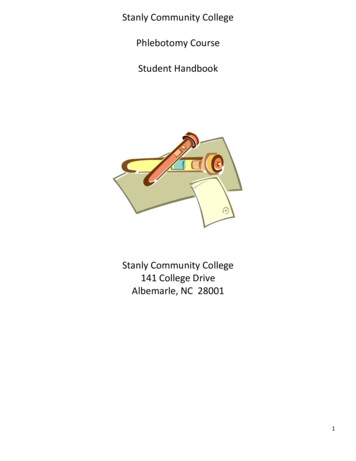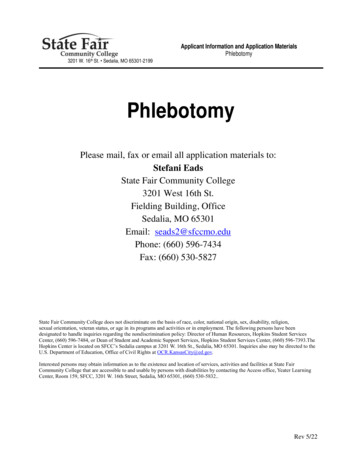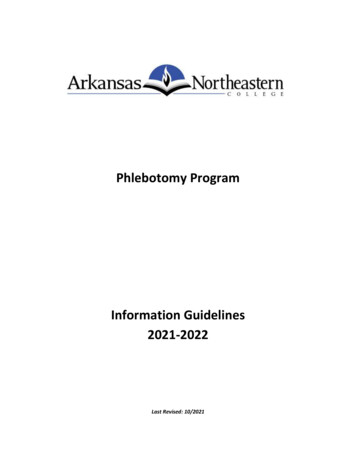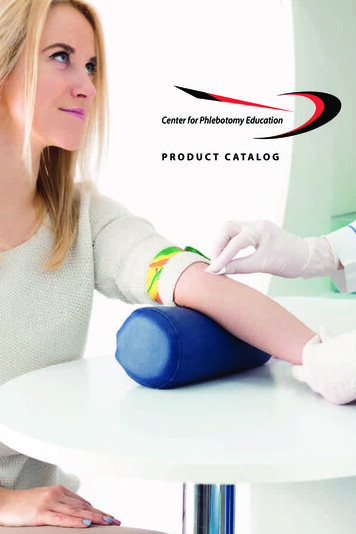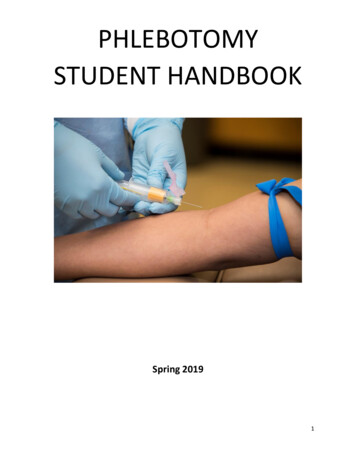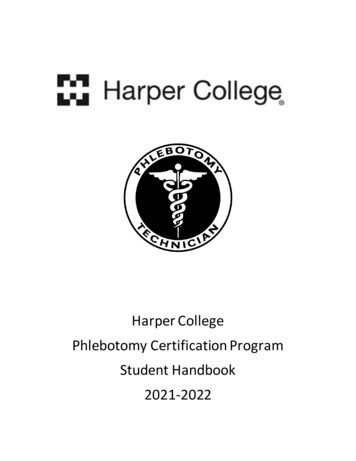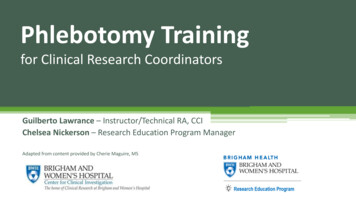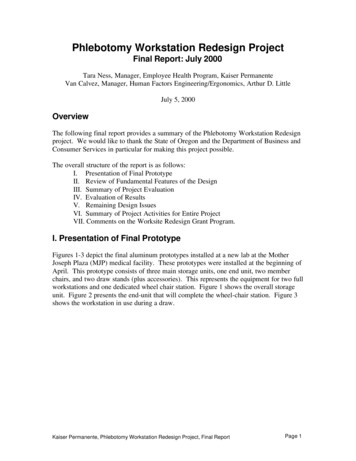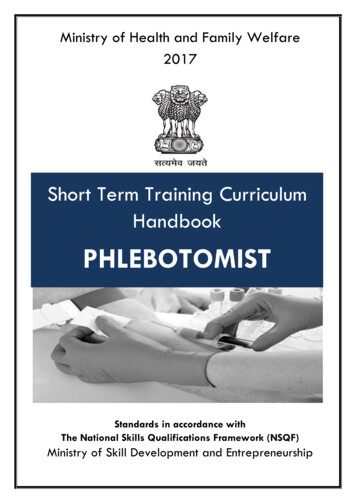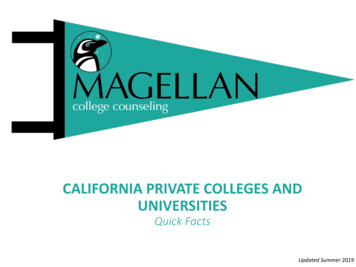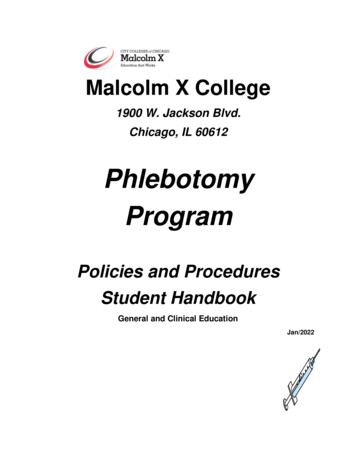
Transcription
Malcolm X College1900 W. Jackson Blvd.Chicago, IL 60612PhlebotomyProgramPolicies and ProceduresStudent HandbookGeneral and Clinical EducationJan/2022
TABLE OF CONTENTSSTATEMENT OF AGREEMENT . 3MISSION STATEMENT .4-5PROGRAM OVERVIEW . 5PROGRAM ACCREDITATION/APPROVAL . 6CERTIFICATION/PROGRAM GOALS . 6CODE OF ETHICS . . 7CODE OF DUTIES . .7-8COVID-19 (Screening/Re-entry/Testing) .9APPLICATION PROCESS .9-10BACKGROUND 9-10PROGRAM OUTCOMES . 11COURSE DESCRIPTIONS. 11-12STUDENT SUPPORT SERVICES/COURSES FOR COMPLETION . 13-14PROGRAM ESSENTIAL FUNCTIONS 14DRESS CODE . . .15-16CLASSROOM AND LABORATORY ATTIRE. . .17CLINICAL ATTIRE . . .17CAMERA ON POLICY . . 17CLINICAL AND LABORATORY ATTENDANCE . .17-18CONDUCT IN CLASSROOM AND LABORATORY . . 18-19CLINICAL ATTENDANCE AND CONDUCT . .19PREGNANCY POLICY 20PROGRAM POLICIES AND STUDENT GUIDELINES . .21-22DISSMISAL FROM PRORAM . .22STUDENT RIGHTS .23GRADING POLICIES .23COURSE EVALUATIONS .24CLINICAL POLICIES . .24-26CLINICAL EVALUATIONS/TERMINATION .27CLINICAL PRACTICUM AND CERTIFICATION .28-29HEALTH REALATED PROGRAM RISKS/HEALTH INSURANCE . 30-32STUDENT CODE OF CONDUCT .33
SOCIAL MEDIA POLICY . . . 34STUDENT MALPRACTICE/LIABILITY . . .35ACADEMIC/NON-ACADEMIC FORMAL COMPLIANT FILING PROCEDURE . 36-38VETERAN’S READMISSION POLICY . . 38-39APPENDIX . .42-51ESSENTIAL PERFORMANCE REQUIREMENTS . . . . . .48ACCIDENTS . . . 51INCIDENT REPORT. . . .52ACKNOWLEDGMENT OF STUDENT HANDBOOK . . 533
Malcolm X College Mission StatementMalcolm X College provides accessible liberal arts and health‐focused education that fosters personaland professional achievement.Malcolm X College VisionMalcolm X College will be a leader in post-secondary education to enlighten and empower the urbancommunity.Goals Provide comprehensive, updated, and articulated baccalaureate curricula, which enable studentsto transfer successfully to four-year institutions.Offer accredited career and occupational programs to prepare students for the workforce.Provide learning opportunities of different levels and types to promote learning, personal growth,skill improvement, and academic development.Sustain and augment partnerships with community organizations, businesses and industries, andK-12 schools in order to support community growth and enhancement.Institute an assessment process to evaluate student growth and improve instruction.Sponsor events and develop curricula in order to promote cultural and global awareness.Provide superior customized and comprehensive support services in order to increase students'access to and success in higher education.Maintain and develop administrative and fiscal policies and practices which foster fairness andaccountability.Pursuit of this mission is guided by our core values. Accountability: We emphasize diligence and innovation in order to promote efficient and effectivelearning.Communication: In order to promote understanding and accessibility we encourage sharingideas and information.Community: We support our community by promoting collaboration and cooperation in activitiesthat enhance the quality of life.Diversity: We value differences among individuals and prepare ourselves to live successfully in aglobal society.Integrity: Our policies and practices center around honesty, professional ethics, responsibility,and fairness.4
Learning: We promote student-centered learning and lifelong learning among faculty, staff, andstudents.Quality: We emphasize continuous improvement in the quality of student learning experiences.Respect: We appreciate and consider the choices, endeavors and relationships of others.Service: We are committed to providing supportive services that meet the needs of our studentsPhlebotomy Program Mission StatementThe mission of the Phlebotomy Program is to graduate competent and ethical phlebotomists with theknowledge and the skills for career entry in the laboratory profession. It is also the department’s missionto support the MXC mission by offering quality phlebotomy courses designed to prepare students todemonstrate the skills and behaviors compatible with those of professional phlebotomists.Non-Discrimination PolicyThe City Colleges of Chicago does not discriminate of the basis of race, color, national origin, sex, sexualorientation, religion age disability or marital status in its employment practices, admissions policies oraccess to its educational programs, resources, and activities.Phlebotomy Program OverviewThe program is completed in one semester, in a two-course sequence, which includes: Phlebotomy 109Practicum and Seminar I- PBT 109 and Phlebotomy 209 Practicum and Seminar II- PBT 209.Introduction to Phlebotomy. Students are also required to enroll in and pass Biology 120 MedicalTerminology for Health Professions before obtaining their certificate of completion in the PhlebotomyProgram. The program consists of 16 credit hours. The PBT 109 course will cover the following topics:The Health Care Delivery System, Infection Control, Safety, Anatomy, Physiology, and MedicalTerminology. This course provides students with an opportunity to understand principles of sterile andaseptic techniques, gives criteria for selection of site for venipunctures and capillary sticks and allowsstudents to practice blood withdrawal procedures. The PBT 209 course will offer the following topics: Aminimum of 100 successful unsupervised venipuncture using standard equipment is required for thecompletion of this course. Topics such as stress management quality assurance and quality control,continuation of medical terminology legal aspects of phlebotomy, data entry, and cardio-pulmonaryresuscitation (CPR), will be discussed. The student will also be trained on how to perform a basic 12lead electrocardiogram (ECG).Person’s seeking entry-level position as phlebotomists in hospitals, medical centers, home health carecenters, clinics and other healthcare delivery institutions can enroll in the Phlebotomy Program at MalcolmX College. Phlebotomists are much-needed healthcare professionals in the United States. Thephlebotomist is responsible for procuring blood specimens from patients in various settings andtransporting the specimens to the laboratory. The necessity for quality specimen collection and specimenpreparation before testing is paramount to producing quality results for the most accurate diagnosis and5
treatment of patients. The phlebotomist is expected to be proficient in venous and skin punctures. Thecurriculum provides students with the knowledge and skills required for entry-level phlebotomist. Theprogram is offered on-campus in the format of an accelerated program with students completing in onesemester. The Phlebotomy program is Illinois Community College Board (ICCB) and National PhlebotomyAssociation Inc. (NPA) approved. Graduates are eligible to sit for a national certification exam, howeverbeing awarded an MXC Phlebotomy certificate is not contingent upon passing the phlebotomy certificationexam. Those graduates that choose to become certified most often take the National PhlebotomyAssociation (NPA), ASCP Board of Certification (BOC) exam, National Healthcare Association (NHA), orAmerican Medical Technologist (AMT).The Phlebotomy 109 and Phlebotomy 209 courses will provide the student with 200 hours of hands-onexperience in both venous and capillary blood drawing in a clinical setting (i.e. hospital and ambulatoryhealth care environment) and in the phlebotomy laboratory during clinical practicum.CertificationUpon completion of the program, the student will be eligible to sit for the certification examination,administered by the National Phlebotomy Association Inc. (NPA) based in Maryland at the followingaddress: 1901 Brightseat Rd. Landover, MD 20785 (301) 386-4200 or (301) 386-4203. NPA will send arepresentative to the college to administer the exam once they receive applications from a cohort ofstudents; Malcolm X College is an official testing site for NPA. The fee for the examination is 170.00;students can also take the online practice exam for an additional fee of 70.00 go to the NPA website atwww.nationalphlebotomy.org click on the Education Link or go to naltphle@aol.com. Also, questionsregarding the NPA certification can be sent to certificaton@nationalphlebotomy.org.The other organizations that can administer the exam are the American Society for Clinical Pathologists(ASCP) based in Illinois at the following address: ASCP Board of Registry, 33 W. Monroe ST., Suite1600 Chicago, IL. 60603 (312) 541-4700, Fax (312) 541-4998. The fee for the examination is 170.00the students can apply by mail or online and take the test at a location designated by ASCP. MXCPhlebotomy program falls under the route two requirements for eligibility to the examination. Othernational phlebotomy certification exams students can take are National Health career Association (NHA).The NHA examination fee is 115.00; go to NHA website at www.nhanow.com, based in Kansas at thefollowing address: NHA Certification, 11161 Overbrook Rd. Leawood, KS 66211 and take exam at adesignated testing site, or the American Medical Technologists (AMT) based in Illinois at the followingaddress: AMT Certification, 10700 W. Higgins Rd, Rosemont, IL 60018 and take the test at a locationdesignated by AMT. The AMT fee for the examination is 120.00; go to AMT website atwww.americanmedtech.org.Note: However, passing a certification examination is not a prerequisite for being awarded a certificate of completion by MXC.The agencies and is not a prerequisite for being awarded a certificate of completion by MXC. The agencies and contactinformation where more information can be obtained regarding eligibility, application, and contact information where moreinformation can be obtained regarding eligibility, application, and procedural information are:6
Program Accreditation/ApprovalMalcolm X College Phlebotomy Program is an approved Phlebotomy Program from the NationalPhlebotomy Association (NPA), Inc. The program is in good standing with NPA. Upon successfulcompletion of the program, the graduate will obtain a Certificate of Completion in Phlebotomy.Program GoalsThe goals of the Phlebotomy program are to provide a base theory and practice that is appropriate todevelop entry-level phlebotomy skills to a phlebotomist. Provide a program with ongoing programapproval guidelines that are maintained by National Phlebotomy Association, Inc. (NPA). Thephlebotomy program will also demonstrate support of the college mission and goals. The program willsupport the profession by preparing graduates who are competent and ethical in the skill of phlebotomy.The program will continue to prepare graduates to successfully complete a national certification examwith high passing scores.When students have successfully completed the basic certification in phlebotomy program in one semesterPhlebotomy program, they should be able to: Demonstrate proficiency in all areas of phlebotomy related to pre-analytical processes oflaboratory testing, recognizing and adhering to infection control and safety policies andprocedures.Demonstrate the theoretical knowledge needed to assure the quality of phlebotomy processesthrough appropriate quality control methods, thus contributing to the accuracy of laboratory testresults.Exhibit the professional attitudes and behaviors that are necessary for Phlebotomy Technicians.Meet requirements to take a national certifying examination for Phlebotomy Technicians.This course will train students to utilize necessary scientific principles and to select appropriatephlebotomy actions.This program shall train students to adapt phlebotomy methods to current developments inrelated fields.Phlebotomy Advisory CommitteeDirection and guidance for the program is achieved through the Phlebotomy Program Advisory. Thiscommittee recommends policies and procedures, helps to modify the curriculum, identifies programgoals, strengths and weaknesses, and determines methods of program improvement. The committeeusually meets twice a year during the Fall and Spring semesters.7
Phlebotomy Code of EthicsThe health care profession relies on the knowledge, skills, honesty, and integrity of trained competentprofessionals. The Phlebotomy profession demands careful attention to detail, accuracy, andprofessionalism.Phlebotomists must assume responsibility to for the quality for their work and our employers rely on ourprogram to produce ethical healthcare workers. The Code of Ethics of the American Society of ClinicalLaboratory Science (ASCLS) sets forth the principles and standards by which clinical laboratoryprofessionals practice their profession principles and standards.Duty to the PatientClinical laboratory professionals are accountable for the quality and integrity of the laboratory servicesthey provide. This obligation includes maintaining individual competence in judgment services theyprovide. Clinical laboratory professionals maintain high standards of practice. They exercise soundjudgment in establishing, performing, and evaluating laboratory testing. Clinical laboratory professionalsmaintain strict confidentiality of patient information and test results. They safeguard the dignity andprivacy of patients and provide accurate information to other healthcare professionals about the servicethey provide.Duty to Colleagues and the ProfessionClinical laboratory professionals uphold and maintain the dignity and respect of our profession and striveto maintain a reputation of honesty, integrity, and reliability. They contribute to the advancement of theprofession by improving the body of knowledge, adopting scientific advancement that benefit the patient,maintaining high standards of practice and education and seeking fair socioeconomic working conditionsfor members of the profession. Clinical laboratory professionals actively strive to establish cooperativeand respectful working relationships with other health care professionals with the primary objective ofensuring a high standard of care for the patient they serve.Duty to SocietyAs practitioners of an autonomous profession, clinical laboratory professionals have the responsibility tocontribute from their sphere of professional competence to the general well being of the community.Clinical laboratory professionals comply with regulations pertaining to the practice of clinical laboratoryscience and actively seek to meet the high standards of care, which the profession is committed.Pledge to the ProfessionAs a clinical laboratory professional, I strive to: Maintain and promote standards of excellence Preserve the dignity and privacy of others Uphold and maintain the dignity and respect of our profession Seek to establish cooperative and respectful working relationships8
Contribute to the general well-being of the communityI will actively demonstrate my commitment to these responsibilities for my professionCOVID-19 (Self Screening/Re-Entry) and TestingHave you been asked to self-isolate or quarantine by anyone, including your employer, a medicalprofessional or a local public health official, or have you returned from travel from a location currentlyexperiencing a surge in new COVID-19 cases and requiring self-quarantine per a City of Chicagoemergency travel order, in the last 14 days?”COVID-19 vaccination is required for all clinical externships for the Phlebotomy program.Application ProcessThe Malcolm X College Phlebotomy program accepts applications for admission into the program for theFall and Spring Semester cohort.Program Admission RequirementsHIGH SCHOOL DIPLOMATO BE ACCEPTED TO THE PROGRAM THE STUDENT MUST HAVE THE FOLLOWING:Eligible for English 96 (must meet one of the following): 1. 1.2.Within a years’ time from the start of the semesterCCC English Placement (CC RTW) score of 3 or aboveWithin 4 years’ time from the start of the semester:Score of ACT: 21 or higher, ORScore of SAT: 540 or higherUPON ACCEPTANCE INTO THE PROGRAM, THE FOLLOWING ARE NEEDED:**Proof of current health insurance.**Proof of recent medical examination.Malcolm X College Castle Branch- Phlebotomy: (Required prior to being placed in ClinicalRotation)Attention all Phlebotomy Students:Regarding your Castle Branch:Background is good for 12 months cost to register is 47. (Please see me if you had one within 12months). The Background is a requirement of the Clinical Site prior to placement at the affiliated hospitaland/or clinic.9
Drug Screen and Medical Document Manager ( 69).*Drug Screen (10 panel urine drug screen)- 30 days prior to start of Clinical (Do not order drugtest until scheduled for Clinical Site). The clinical site could test for a random drug test during theclinical externship, this is at the discretion of the clinical site.*Medical Documents- Measles (Rubeola), Mumps, Rubella, Varicella and Hepatitis within 10 years stillwill be acceptable (titers ONLY)*TB or QuantiFERON Gold*Influenza Vaccination*COVID-19 Vaccination (Students that are vaccinated please upload the documentation to CastleBranch)*COVID-19 testing is required for all clinical externships. .(Upload the results to Castle Branch). COVID19 vaccination is a requirement for placement at ACL/Advocate laboratories. Upload vaccination card tocastle branch in the medical management. Sites can still require weekly testing as well.* Admissions package*Medical form*Healthcare provider release*Health History*Physicial Assessment*Student Healthcare Information Release*CPR card (valid certification prior to PHLEB 209) ONLY BLS CPR for Healthcare Providers Acceptablefrom the American Heart Association*Insurance card (Insurance is ONLY Required for All Alverno Laboratories)Note: Only required fees for the Phlebotomy Program are for Castle Branch to administer theBackground, Drug Screen and Medical Document Manger. It is Mandatory all medicaldocuments, admissions documents including your CPR card are to be uploaded to the MedicalDocument Manager in Castle Branch.Background: (Students with a Criminal Background)Students with a criminal background are highly encouraged to seek expungement (preferred) orthe health care waiver. Failure to do so, may impact the ability of the program to secure clinicalplacement opportunities for you. Clinical education is a mandatory piece of the curriculum.Failure to complete for any reason will result in a student being unable to progress through theprogram. A health care waiver does not automatically allow a student to be admitted into aclinical site for placement. Each clinical partner determines whether or not to accept a health carewaiver and Malcolm X College cannot guarantee that a student with a health care waiver will beaccepted into a clinical placement.10
Program Outcomes:The Malcolm X College Phlebotomy Program uses the following criteria to measure the effectiveness ofthe program. Student passing scores on National Phlebotomy Certification exam results Attrition Rate Retention/Graduation Rates Graduate Survey Employer Survey Faculty Survey Final Capstone Disease Project and PresentationProgram Assessment: National Phlebotomy Certification success rate in passing Retention/Attrition Job Placement Graduate Survey Success and Participation Employer Survey Success and ParticipationPhlebotomy Program CoursesCourse DescriptionsPhlebotomy 109 Seminar I- Introduction to Phlebotomy. This course will cover the following topics:The Health Care Delivery System, Infection Control, Safety, Anatomy, Physiology, and MedicalTerminology. This course provides students with an opportunity to understand principles of sterile andaseptic techniques, gives criteria for selection of site for venipunctures and capillary sticks and allowsstudents to practice blood withdrawal procedures.Course Objectives:1.To demonstrate a knowledge of laboratory terminology.11
2.To become aware of the different types of medical facilities, the healthcare team and the roleof the phlebotomist as a member of the team.3.To become knowledgeable about the difference between contamination, asepsis and sterility4.To become familiar with isolation techniques and immunity.5.To develop an understanding of the infection process, the mode of transmission and portal ofentry.6.To obtain a basic understanding of the anatomy & physiology of body systems.7.To understand the importance of specimen collection and correct patient identification.8.To become familiar with equipment, supplies and reagents used in phlebotomy procedures.9.To successfully perform five (5) supervised venipunctures on fellow students: three (3)using the standard needle holder and evacuated tubes; one (1) using a butterfly needle;one (1) using a syringe.Phlebotomy 209 Seminar II- This course provides the student with 200 hours of hands-onexperience in both venous and capillary blood drawing in a clinical setting (i.e. hospital and ambulatoryhealth care environment) and in the phlebotomy laboratory during clinical practicum. A minimum of 100successful unsupervised venipuncture using standard equipment is required for the completion of thiscourse. Topics such as stress management quality assurance and quality control, continuation ofmedical terminology legal aspects of phlebotomy, data entry, and cardio-pulmonary resuscitation (CPR),will be discussed. The student will also be trained on how to perform a basic 12-lead electrocardiogram(ECG).Course Objectives:1.To become familiar with different types of communications styles.2.To explain when dermal punctures should be performed and the equipment used.3.To define quality control, quality assurance, total quality management, and continuous qualityimprovement, and discuss their differences and roles in quality phlebotomy4.To become familiar with procedures to collect specimens which require special collectiontechniques.5.To describe non-blood specimen collection, labeling and handling.12
6.To explain the purpose of electrocardiogram (ECG) and identify the placing of the differentleads.7.To discuss why legal issues are important to the phlebotomist and the different types of lawswhich make up the legal system.8.To be exposed to various types of patient through the clinical rotation at a healthcareinstitution.Phlebotomy Program Basic Certificate Courses for Completion (1 Semester)Phlebotomy 109Phlebotomy 209Biology 120Note: Grade of a “C” or better in all courses for Certificate of Completion to be Conferred. Please besure if you have taken Biology 120 at any other college or university that the course is on your CCCtranscript. Notify MXC registrar at mxregistrar@ccc.edu to ensure the transcript has been audited.Advising, Academic Support, and Career ServicesQuestions regarding advising for Phlebotomy related questions, please contact an Academic advisor inthe Advising Center at 312-850-7185 or other related questions can be discussed with the PhlebotomyProgram Director at cdoby@ccc.edu. The college’s Enrollment Services Division utilizes AdvisingServices to assist students with academic, career (employment, research career and resume), andpersonal choices. They can be reached by the information listed in the chart below:ResourceLocationContact NumberAdvising CenterRoom 1412312-850-7185Career ServicesRoom 1400 A312-850-7267Student Services(a broad range of servicesto assist students inachieving their academicand life goals).1406312-850-7120 or 312850-7121Student Support Services Library Services13
You will have access to the Educational Resource Center at the stated hours. Additionally,there are many online resources available through the college library website. Some of theresources include the catalog system and research databases that include access to manyperiodicals. Additional reference materials can be made available by contacting the MXCFaculty. Disability ServicesMalcolm X College does not discriminate on the basis of disability in admissions, accessto or participation in its programs or activities. Requests for reasonable accommodationsfor a documented disability should be made to the Office of Disability in Room 1406 inthe Student Services Department.Program Essential FunctionsIn addition to the academic requirements of the program, students who are successful in the programand profession must be able to meet the following requirements, with or without reasonableaccommodations:VisionThe student must be able to: Read a patients identification on an ID braceletVerbalize a patients identity by the use of two patient identifiersRead information found on a laboratory requisitionDifferentiate colors of conventional blood collection tubesRead information on a computer screenRead procedures and other necessary information in laboratory manuals and package insertsRead information on product packagingHearingThe student must be able to hear the following: Patient's speakingEquipment and alarmsTelephoneCo-workersTactile ability and manipulative skillThe student must be able to:14
Tactile ability and manipulative skillDiscriminate veins from other structures that are not veinsIdentify the location an character of veinsPerform venipunctures an capillary punctures smoothly enough with coordinated manipulativedexterity so as not to injure the patientCommunicationThe student must be able to: Understand standard EnglishProvide clear verbal directions to patients and coworkers in standard EnglishFollow verbal and written directions in standard EnglishAccurately read any printed information required for the jobMotor FunctionThe student must be able to: Move freely in the laboratory, patient care areas, elevator, and stairwayUse both hands simultaneouslyLift at least 25 poundsDemonstrate fine motor skillsReach and bend wherever necessary, up or down, to perform job tasksMental and EmotionalThe student must be able to: Be flexibleWork in stressful situations while maintaining composureBe adaptable to unpleasant situations common in a clinical settingPrioritize tasks to ensure completion of assigned workProvide service to and interact with patients of diverse age, gender, sexual orientation, race, religion,nationality, physical or mental condition15
DRESS CODE AND ATTIREPersonal Appearance and GroomingHANDS: Smooth, clean and free of hangnailsNo artificial nailsHold the palms of your hands toward you, no fingernails should be seen over the fingersHAIR: Hair must not dangle in the field of operation at any time during lab or at clinicalNo excessive hair accessories including hair feathersClean, neatly groomed, pulled back away from face at all timesHair longer than shoulder length must be worn up and secured backBangs must be no longer than the eyebrows and must not restrict your field of visionGentleman: Facial hair shall be clean, neatly trimmed, and well maintainedJEWELRY: No excessive jewelry (i.e., dangling earrings, large hoops)Earrings limited to one earring per ear lopeNo necklaces hanging down too long to get caught in medical equipmentRings limited to wedding band or engagement ringNo tattoos or body ornaments, unless coveredATTIRE: Uniforms (white scrub set) are ordered from Prism medical at www.prismed.net (school code isC100 and password is Mlclmxcllg for Malcolm X College Phlebotomy program. (Possibly you will beredirected and if so use the password provided by Prism Medical).Scrubs must be neatly pressed and buttoned; stain freeUniform to be worn each day of class (after 1st week of scheduled class) and during the entireclinical rotation (Uniform consists of white professional shoes, scrub set (top and pants), whitelaboratory/warm up jacket (with phlebotomy logo patch)Flat shoes, no open toes shoes, no sandalsShoes with a leather toe, no mesh toes, covered back, no clogs, athletic shoe acceptable(Professional shoe manufacturers: examples are Dansko, Nursemate and Crocs)Socks to cover the ankle in coordinating color of scrub bottomsNo sweaters or jackets over scrubs or white laboratory jacketUndergarments must be wornClean T-shirts may be worn under scrubs, tucked inConservative use of makeup and cologneDaily bathing required16
No Smoking. Smoking is prohibited during lab or clinical sessions (On MXC campus or at affiliatedhospitals. (ONLY Smoke in designated smoking area)Good oral hygiene requiredGloves and lab coats must be worn during labN
The Phlebotomy 109 and Phlebotomy 209 courses will provide the student with 200 hours of hands-on experience in both venous and capillary blood drawing in a clinical setting (i.e. hospital and ambulatory health care environment) and in the phlebotomy laboratory during clinical practicum. Certification
